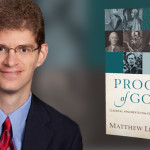Are Metaphysical First Principles Universally True?
by Dr. Dennis Bonnette
Filed under Philosophy, The Existence of God

Today, certain lines of attack against classical proofs for God’s existence, such as St. Thomas Aquinas’ Five Ways, seek to undermine foundational metaphysical first principles such as causality, sufficient reason, or even non-contradiction.1
Such attacks employ, for example, claims that (1) David Hume’s critique of causality is definitive, (2) the existence of the cosmos is simply a “brute fact,” needing no explanation, and (3) modern physics shows that the principle of non-contradiction is routinely violated at the submicroscopic level.
While some “self-evident first principles” appear to hold good for the macroscopic world of everyday experience, they are said to fail in the world of submicroscopic subatomic particles. The famous wave/particle experiments are said to prove that a photon can manifest both as a wave and as its contradictory particle at the same time and in the same place. Some physicists thereby claim that submicroscopic reality regularly violates this most basic metaphysical axiom: that a being cannot both be and not be at the same time and in the same respect.
Yet, these very experiments presuppose the universal validity of said principle, both at the macroscopic scale and at the submicroscopic scale–the latter of which being the level at which it allegedly reveals it is violated. That is, at the submicroscopic scale, the scale at which experimental readings are being taken, the principle is implicitly accepted as inviolable. If a photon manifests as a particle, the experimenter notes that it is a particle. He does not simultaneously allow that it might not manifest as a particle, but as a wave. Observations must be read as they are, not as possibly the opposite–or else, no inferences could be drawn from the experiments. The intelligibility of the wave/particle experiments presuppose the submicroscopic validity of the very principle claimed to be violated. Whatever the actual explanation, no inference against the principle of non-contradiction can be intelligible, since the submicroscopic observations on which the inference is based presuppose its validity.
Others deny the metaphysical principle that from nothing, nothing comes to be, by claiming that particles can pop in and out of existence out of nothing according to Quantum Mechanics (QM). Some speculate entire universes can be so created out of a quantum vacuum. But, according to QM, a quantum vacuum is not really nothing. It is merely the lowest energy state of a quantum field. By “nothing,” the philosopher really means nothing, nothing at all–not the relative “nothing,” which is actually the “something” of the quantum vacuum. Once clarified, the truth that you cannot get something from nothing becomes undeniable.
Still others assume Hume’s notion of “causality” as being a necessary association of mental impressions. Applied to modern science, this is seen as meaning that “given event A, event B will necessarily follow.” Granted, no such universal predictability exists, since something could always interfere with event B. Still, Hume’s notion simply is not the classical metaphysical understanding of causality. In classical metaphysics, if a being or event lacks a sufficient reason for its existence or coming-to-be within itself, then some extrinsic agent must be posited to account for what is lacking in self-explanation. That extrinsic agent is called a cause. Attacking a “causality” that is simply not the one being used by classical metaphysicians in no way furthers the argument of atheists.
Many atheists assume that the universe is its own explanation, and thus, a transcendent deity is unnecessary. More radically, some simply refuse to admit that the cosmos’ existence needs any explanation at all. Of course, the whole point of proofs for God is to disprove such claims and to demonstrate that finite being is unintelligible without an Infinite Being.2
Atheist Kai Nielsen writes, “It is certainly very natural to reject the principle of sufficient reason and to say that it has not been established that there must be … an explanation for everything.”3 The practical problem with Nielsen’s move is that we then have no way of knowing when anything at all needs an explanation. If some things have no explanation, perhaps, nothing has an explanation–thereby rendering all reality unintelligible, including the universal explanations of phenomena offered by modern science. The intellectual suicide of denying all reason is far worse than the claim that the cosmos simply explains itself–a claim of aseity, which can be dispatched by proper use of the proofs for God’s existence.
Attacking metaphysical first principles, modern atheists and agnostics reject the foundational insights of any proof for God’s existence. The natural metaphysics of human intelligence seeks to understand the created world in terms of the intelligibility of finite being. In attempting to grasp the “why” of finite phenomena, proofs for God’s existence arise naturally, since the mind of man rightly suspects that the things of this world do not fully explain themselves, and thus, need extrinsic explanation. Human intelligence follows the path from finite effects, searching for an adequate causal explanation. Metaphysical reasoning inevitably demands assent to the existence of an Ultimate Cause of all creatures, a Cause that is quickly recognized in terms of the classical understanding of God.4
The ultimate irony lies in skeptics attacking first principles used in such proofs, when these same atheists and agnostics necessarily use these same principles themselves in everything they say and do. Every statement in atheist arguments claims to express some truth. Yet, it is a basic principle of logic that the same predicate cannot both be affirmed and denied of the same subject at the same time. This is simply the principle of non-contradiction expressed in logical form. If any interlocutor wishes to make an argument against the proofs for God, he must do so in terms allegedly true. He cannot simultaneously be affirming that said claims are equally false. In a word, all arguments against God’s existence must obey the metaphysical principle of non-contradiction, or else, they are rendered meaningless. As in the case of the wave/particle experiments cited above, the attacks on the principle of non-contradiction presuppose the validity of the very principle they attack. So much for claims made against the principle of non-contradiction.
As to the need for reasons or causes, anyone making a philosophical claim must give reasons for his claim. No one can simply make a claim and expect it to be accepted just because he said it. The question instantly arises, “Why do you make this claim?” The claimant must give reasons for his claim, and the reasons must be adequate–or else, no one will listen to him. In other words, the reasons given for a claim stand as causes of the truth of the claim in the hearer’s mind. Absent adequate and sufficient reasons being given, the initial claim will be dismissed as warrantless–and properly so. Philosophical claims require adequate reasons for their truth. They do not stand of themselves. As such, they stand as effects of causes, which causes (or premises) are the extrinsic reasons for the claims’ truth being known in the mind.
Ironically, David Hume, the philosopher most famous for attacking the principle of causality, apparently could not write a book in English without using the word, “because,” or some equivalent expression, throughout–constantly explaining, as we all must do, why what he is saying ought to be believed.
In a word, the principles of non-contradiction, sufficient reason, and causality are all presupposed by those atheists or agnostics attacking their application in the proofs for God’s existence.
But is this merely a matter of linguistics? No. The reason we seek explanation of the truth of philosophical claims is precisely because we want intellectual assurance that the claims made are supported by reasons that reflect a real world foundation for their claimed truth. Otherwise, philosophical arguments would become nothing but the ravings of lunatics, bearing no relation whatever to extramental realities. If the laws of thought do not reflect the actual laws of being, then the mind becomes utterly useless as an instrument with which to know the real. More importantly, unless everything has a reason, we could never tell whether a thing has a reason or not–thereby effectively destroying the connection between thought and reality, since there would be no necessary reason why reality need correspond to thought. Science would be irrational, since no explanation for anything would ever be required.
A being lacking sufficient reason has no explanation for existence either within or outside itself, which means nothing differentiates it from non-being. Yet, the actual act of existence of every being does differentiate it from non-being. Since such self-contradiction is impossible, every being must have a reason for being.
How can we be sure of the truth of these first metaphysical principles, which permeate the foundations of, not only the proofs for God’s existence, but all aspects of the real world? Consider again the basic truth that from nothing, nothing comes to be. Does anyone genuinely doubt its validity once we remove the false concept of “nothingness” proposed by Quantum Mechanics? Its truth is immediately evident to every human intellect that is not playing games with words. We “see” clearly that absolute non-being provides no reason whatever for the coming-to-be of anything–and that is why it cannot come to be. Why do we see this so clearly? How can we be so sure?
The explanation of this absolute certitude about this basic principle of being is that the human intellect is designed to “see” being with perfect certitude, just as the sun naturally illuminates the sky. Were it otherwise, all the logic in the world could never assure us of any knowledge of reality whatsoever. The mind sees being, even if we cannot account for how its nature enables it to do so. Similarly, sight enables us to see even though there is no adequate explanation as to how this is actually possible. (Biological explanations alone do not actually explain sensory experience.) Once the human intellect first encounters any being whatever, it forms a concept of being that endows it with immediate grasp of its universal application–an application possessed with absolute certitude.
What if we were told that there is something on the other side of the cosmos of which we know absolutely nothing, even as to whether it exists or not? What could we say about it? Nothing? Not so. We instantly would know that either it exists or not. And, if it does, it is what it is, it cannot both be and not be, it needs a reason for existence, and lacking a full reason for existence within itself, something else must exist to make up for whatever is not fully explained by itself. These are immediately known first principle certitudes that we can and do, with apodictic assurance, apply validly to this hypothetical unknown entity on the other side of the cosmos.
As with Kant, these principles hold good for all possible experience; unlike Kant, these principles are transcendentally valid, that is, they apply universally to all being in itself. That is because they are based on the intellect’s grasp of the universal nature of being or existence itself–not on some limited essence which applies to only a certain limited expression of existence, such as “macroscopic,” “intramental,” or “phenomena.”
Once one encounters and grasps what is essential to water, that knowledge holds good for all possible water. Still, one might encounter some non-water, whose essence would be unknown. But, once one grasps what is essential to being, that knowledge holds good for all possible being. One will never encounter non-being.
Nor is there another system of philosophy or method of natural science that escapes the basic truths stated above, since every system or method asserts claims in absolute terms and must give reasons for its claims. Even claims that such and such is merely probable or possible assert in absolute terms the claim itself. To say that something is possible is to affirm absolutely a condition of reality compatible with it happening. He who says anything less says nothing at all. Philosophers love to affirm that they are right and everyone else is wrong. That itself is to accept the principle of non-contradiction. The moment they concede the need to give reasons for their brilliant insights, they thereby also concede the principles of sufficient reason and causality. Following the principle of non-contradiction, either the intellect is a trustworthy cognitive power or it is not. If it is not, then all knowledge is a useless charade–and even this inference itself is meaningless. Unless the intellect actually reflects being itself, it bears no relation to reality–again, making it utterly worthless, even less so than the subjective reality of an hallucination.
How is all this possible? Simply because the mind or intellect is made to know being, and to know it with certitude in terms of its basic principles. How is it made this way? We haven’t a clue. To know the answer to this would be to be the One who made the intellect, and we are not He.
But, if we cannot explain how the intellect comes to possess this immediate grasp of being, how can it actually be relied upon? Consider the example of skipping down the stairs two at a time. Presuming we can do this successfully, we know we are doing it in the very act of doing it. But, do we know exactly how we are doing it? Do we reflect on how we do it at that precarious moment? Likely not! Or else, we would doubtless wind up in the emergency room. In other words, skipping down the stairs and knowing that one is doing it are not identical to being able to explain precisely how we do it. Yet, that does not lessen the fact that we are doing it and know with immediacy the truth that we are performing the act–even though, at that same time, we cannot possibly be reflecting on how we are doing it without risking breaking our necks!
So, too, the intellect knows immediately, from the concept of being (which it forms from its very first experience of anything at all), the metaphysical first principles that (1) contradictions are impossible, (2) things must have reasons, and (3) failing to have reasons of themselves, things need extrinsic reasons or causes to explain themselves. These self-evident metaphysical first principles are necessarily employed even by those who deny their existence, and most certainly, validly apply to the Five Ways of St. Thomas Aquinas as well as to other legitimate metaphysical proofs for God’s existence and to any and all aspects of the real world.
Related Posts
Notes:
- See St. Thomas Aquinas, Summa theologiae, I, q. 2, a. 3; see also, Summa contra gentiles, I, 13, 15. ↩
- See Dennis Bonnette, Aquinas’ Proofs for God’s Existence (Martinus-Nijhoff: The Hague, 1972). ↩
- Kai Nielsen, Reason and Practice: A Modern Introduction to Philosophy (New York: Harper and Row, Publishers, 1971), 181. ↩
- Aquinas, Summa theologiae, I, qq. 3-11. ↩
Note: Our goal is to cultivate serious and respectful dialogue. While it's OK to disagree—even encouraged!—any snarky, offensive, or off-topic comments will be deleted. Before commenting please read the Commenting Rules and Tips. If you're having trouble commenting, read the Commenting Instructions.












